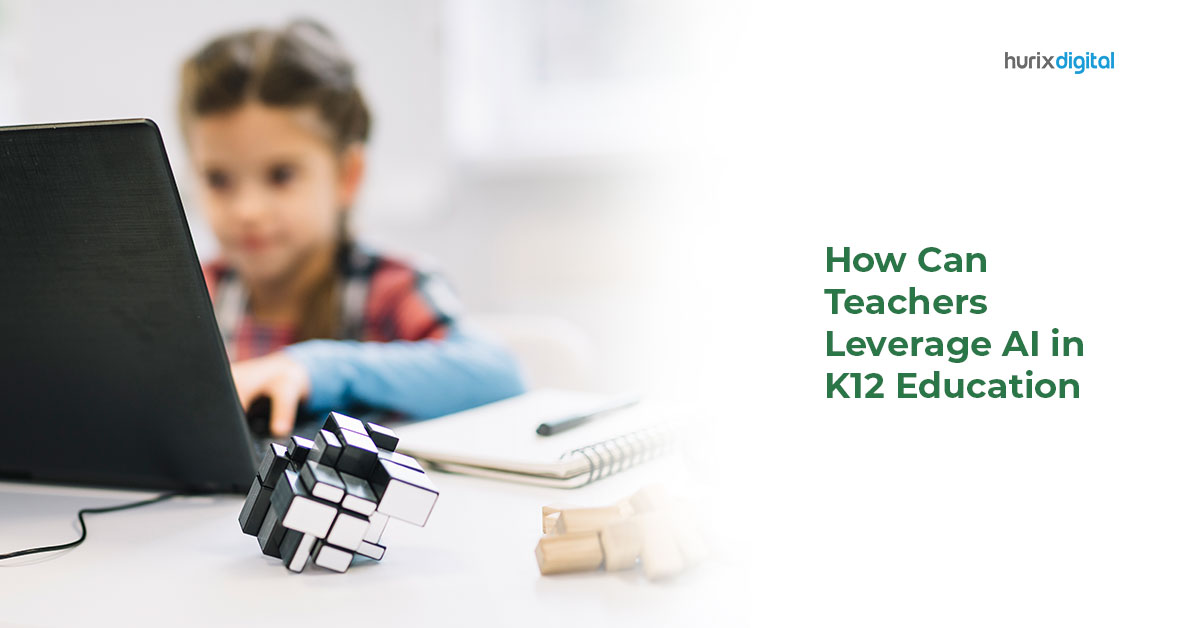How Can Teachers Leverage AI in K12 Education?
Artificial Intelligence (AI) is a computer program’s ability to perform tasks such as thinking and learning, similar to how humans work. Creating solutions once thought impossible, AI is a key driver of innovation and growth across all industries, the K12 EdTech companies being no exception.
Educational technology and AI development are advancing quickly thanks to the recent global pandemic. As per Technavio’s report, the AI market in the US educator sector is projected to grow by 48.15% over the next three years.
In this article, we’ll discuss the impact of artificial intelligence in education and its benefits to teachers.
Table of Contents:
Role of AI in Higher Education
Available in several technologies, AI is already playing a pivotal role in many K12 educational systems, offering promising benefits to integrate now and in the future. AI agents can be intelligent tutors, supporting and motivating learners in many ways.
Teachers can leverage AI-powered products that use text-decoding solutions to individualize instruction. With AI translation technology, educators can interact with multilingual parents. Accessibility checkers and Computer Vision (CV) techniques are helping teachers enhance access for low-vision learners.
It’s no wonder that 83% of educators believe AI technology must be incorporated into K12 learning.
Current Scenario of Teachers in K12 Education
With rising learner needs, paperwork, and administrative burden, the K12 teachers are under immense pressure and stress. The teacher turnover in the U.S. hit a new high as more teachers left classrooms across 8 states after the last school year.
From drafting question papers late at night to preparing lesson plans and grading the answer sheets, the majority of time spent by K12 teachers is on preparation, administrative, and evaluation tasks.
The high attrition and turnover rates of teachers are testaments to the real pressure on educators. U.S. schools are finding it difficult to retain teachers and hire new ones.
Also Read: 5 EdTech Methods Your Competitors Use for K-12 Education
How AI in K12 Education Can Help Teachers?
The effective use of AI technology can relieve K12 teachers and make their life stress-free.
AI can help free up teachers’ time by analyzing learner performance and automating tasks. It allows teachers to reallocate their unproductive time to productive tasks like direct student interaction to achieve better outcomes.
Here’s how teachers can benefit from AI in K12 education:
1. Saving Preparation Time
The teachers in the U.S. spend significant time on preparation activities. Artificial Intelligence (AI) tools can cut down this time to half and make the preparation activities more efficient. AI in online education enables teachers to develop better lesson plans and approaches.
With the help of multiple mathematics tools, teachers can analyze the current level of learners’ understanding and group them based on their needs. These tools also recommend problem-solving activities and lesson plans. This reduces the burden of preparation on K12 teachers significantly.
2. Detailed Evaluation and Feedback
The teaching loop remains incomplete without effective evaluation and feedback. Technological advances in NLP (Natural Language Processing) have enabled computers to evaluate and provide formative, detailed feedback across essays in all subject matters.
A writing software, for instance, can analyze trends in writing across various long-form answers to give targeted learner feedback that K12 teachers can review and personalize. When put together, these technologies provide excellent K12 solutions that save considerable time teachers spend on evaluation and feedback.
3. Personalized Learning
Artificial Intelligence (AI) tools can analyze students’ history and learning abilities, allowing teachers to cater to the unique needs of each student. They also provide a clear picture of which lessons and subjects have to be re-evaluated, enabling teachers to develop interactive and innovative learning programs.
By identifying each student’s strengths and weaknesses, professors and teachers can adjust their study material to address the challenge areas or most common skill gaps before a student loses the learning momentum.
Also Read: Creating Personalized Learning Experiences with K-12 Content Solutions
4. Answering Questions
AI programs can support students and help them have social learning even when they are studying independently.
AI-powered chatbots can access the entire knowledge base of a school and answer a wide range of repetitive and generic questions asked by students without the help of professors or teachers.
This leaves more time for teachers to dedicate to curriculum research, lesson planning, and enhancing student engagement.
5. Administrative Task Automation
Implementing AI in K12 education can automate the most mundane tasks, including assessing learning patterns, administrative work, grading papers, answering general questions, and more.
Rather than individually grading each student’s assignment, artificial intelligence (AI) tools can automatically evaluate and grade learners’ work simultaneously. With support from such tools, manual processes can be automated, giving sufficient time to teachers to focus on teaching core competencies.
6. Blended Learning
Blended education combines online and in-class approaches to learning and teaching, allowing students to learn the best of both. It is a hybrid education approach that integrates cognitive technologies like Machine Learning and Artificial Intelligence (AI) with traditional instructor-led classroom activities, providing enriching experiences for students and greater flexibility for teachers.
K12 teachers can leverage several AI tools to implement blended learning into the physical classrooms for fun and interactive learning for the students. This makes learning resources more accessible to learners, which in turn helps improve learner outcomes.
7. Social-Emotional Learning and Collaboration
As seen above, the greatest benefit AI can offer teachers is time. Additional time enables teachers to foster one-on-one relationships with students and help learners collaborate. Strong teacher-student relationship promotes student well-being and learning.
Teachers can also spend more time collaborating to develop and improve their craft. Collaborative lesson planning and peer coaching translate into better learning outcomes.
8. 24*7 Instant Access to Resources
With AI-powered tools, K12 teachers can access the right resources anywhere and anytime. By providing instant access to quality resources whenever teachers need them, AI tools save a lot of energy and time for K12 teachers.
Wrapping Up!
From fully remote lectures to online textbooks, the advancements in EdTech continue to expand. With innovation at the forefront, teachers are embracing AI to automate and optimize both teaching and learning tasks.
The increasing adoption of artificial intelligence (AI) won’t replace K12 teachers but will rather help them save time. As the AI industry expands, there’ll be more improved and innovative learning outcomes for all educators and students in the future.
To explore effective K12 content solutions, get in touch with HurixDigital today! Hurix’s higher education solutions equip schools with the platform and technology required to offer a holistic learning experience to students.

Senior Vice President – Business Development
Over 25 years of experience in the edtech and workforce learning industry with strong skills in Business Development, Customer Relationship Management (CRM) and Strategy.









